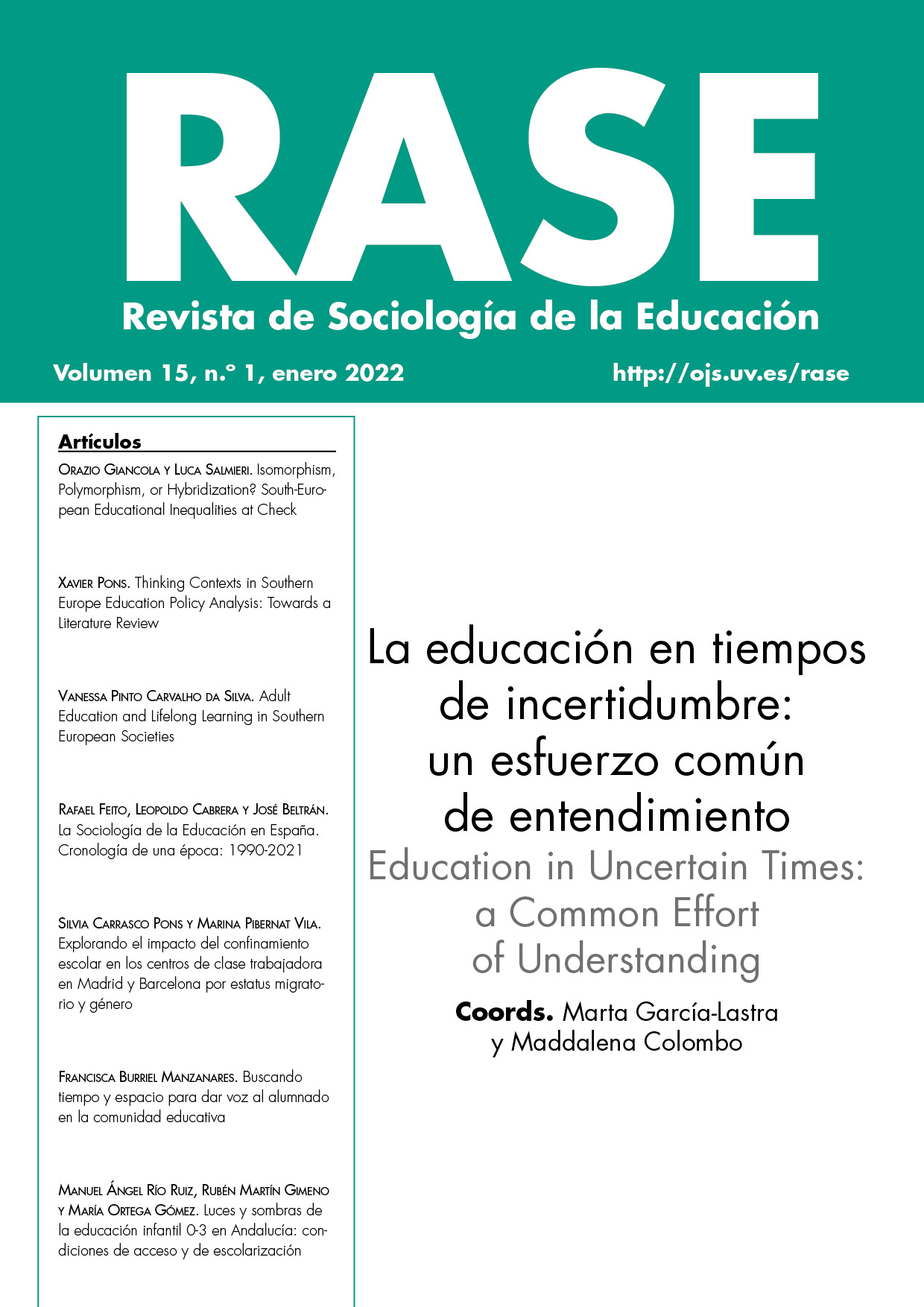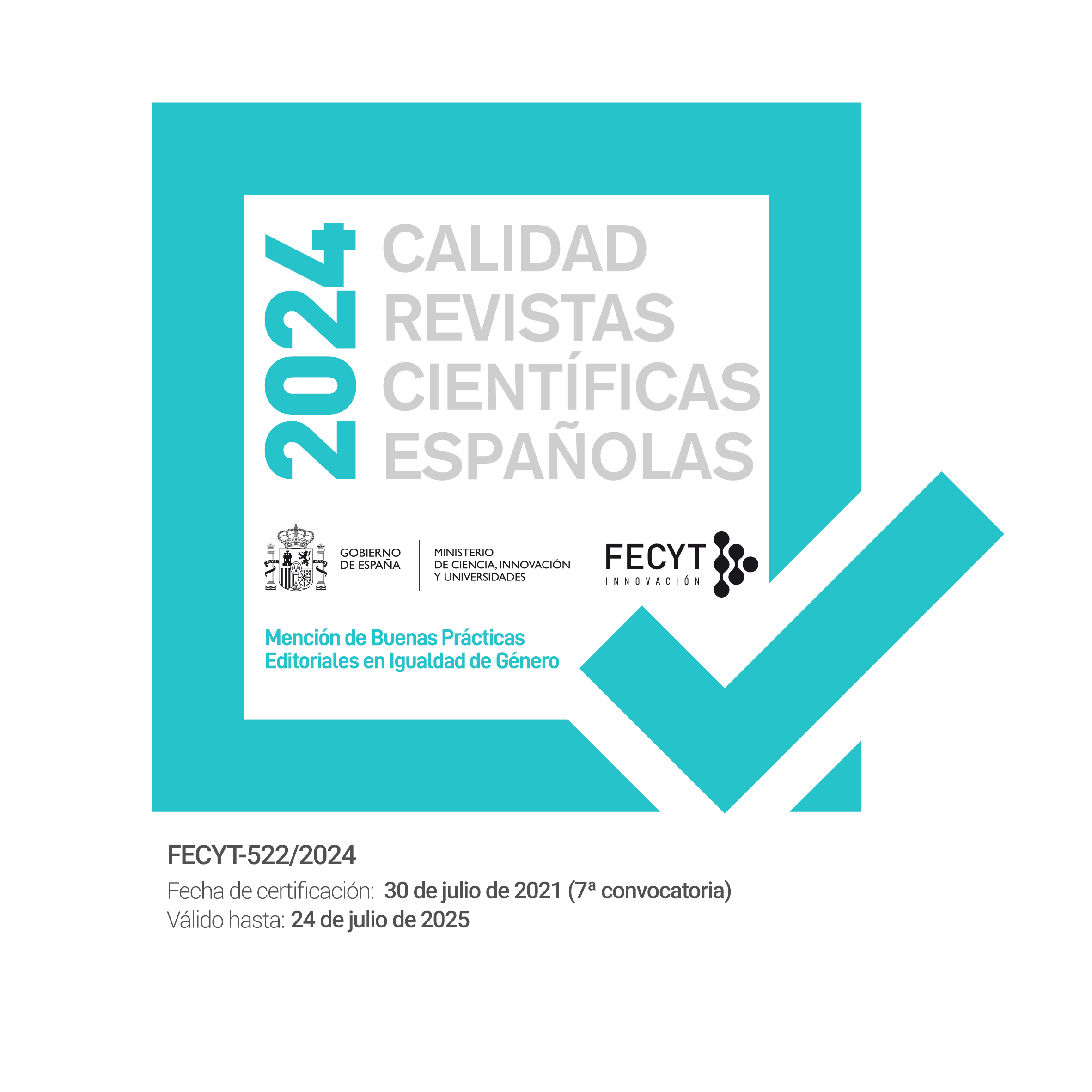Thinking contexts in Southern Europe education policy analysis: towards a literature review
DOI:
https://doi.org/10.7203/RASE.15.1.22161Palabras clave:
Education policy, context, Southern Europe, literature review, sociology, vernacularisation Resumen
Resumen
This article presents the very first findings of a scoping literature review on how scholars who work on French, Italian and Portuguese education policies consider and possibly conceptualise policy contexts in their analysis. Going through 175 articles published either in English or in French, it shows that the authors in the publications studied tend to contextualise little the analysis of education policies and that when they do so, there are no specific contextualisation operations for authors working on Southern European countries. Nevertheless, the presence of different analytical sensitivities from one country to another, as well as the still numerous limitations of our method, which is still in progress, suggest that the construction of a specific problematisation space remains possible, particularly around the logics of vernacularisation of global policy statements and requirements.
 Descargas
Descargas
 Citas
Citas
Adrião, T., & Silva, R. da. (2020). Public funding to private providers of compulsory education: Crossed looks between Brazil and Portugal in the context of globalisations. Globalisation, Societies and Education, 18(4), 420–434. https://doi.org/10.1080/14767724.2020.1764336
Álvares, M. (2018). Fault lines in education: Dualization and diversification of pathways over 40 years of debate on education policy in Portugal. Sociologia, Problemas e Práticas, 87, 45–70.
Alves, I. (2019). International inspiration and national aspirations: Inclusive education in Portugal. International Journal of Inclusive Education, 23(7–8), 862–875. https://doi.org/10.1080/13603116.2019.1624846
Alves, I. (2020). Enacting education policy reform in Portugal – the process of change and the role of teacher education for inclusion. European Journal of Teacher Education, 43(1), 64–82. https://doi.org/10.1080/02619768.2019.1693995
Antunes, F. (2004). Globalização, europeização e especificidade educativa portuguesa: A estruturação global de uma inovação nacional. Revista Crítica de Ciências Sociais, 70, 101–125. https://doi.org/10.4000/rccs.1051
Antunes, F. (2016). Economising education: From the silent revolution to rethinking education. A new moment of Europeanisation of education? European Educational Research Journal, 15(4), 410–427. https://doi.org/10.1177/1474904116641696
Barrault-Stella, L. (2012). Les résistances de la carte scolaire. Les limites du volontarisme politique dans l’action publique. Politix, 98(2), 109–127. Cairn.info. https://doi.org/10.3917/pox.098.0109
Barrault-Stella, L. (2016). Produire un retrait de l’État acceptable. Les politiques de fermetures scolaires dans les mondes ruraux contemporains. Gouvernement et action publique, VOL. 5(3), 33–58. Cairn.info. https://doi.org/10.3917/gap.163.0033
Barzanò, G., & Grimaldi, E. (2013). Discourses of merit. The hot potato of teacher evaluation in Italy. Journal of Education Policy, 28(6), 767–791. https://doi.org/10.1080/02680939.2013.774439
Berthet, T. (2019). Dispersion scolaire et politiques publiques contre le décrochage en Italie. Formation Emploi, 147, 89–112. https://doi.org/10.4000/formationemploi.7643
Bertiglia, M., & Panaro, N. (1996). La politique scolaire rurale en Italie. Revue Internationale d’éducation de Sèvres, 10, 75–82. https://doi.org/10.4000/ries.3320
Bongrand, P. (2012). La mise en système et l’économicisation de l’enseignement en France au début des années 1950: La fonctionnalisation d’une institution. Politix, 98(2), 35–56. Cairn.info. https://doi.org/10.3917/pox.098.0035
Borghi, L., & Scarangello, A. (1960). Italy’s Ten-Year Education Plan. Comparative Education Review, 4(1), 26–30. JSTOR.
Buisson-Fenet, H. (2004a). Territoire flou, territoire approprié. Le cas des « bassins de formation » dans l’Éducation nationale. Lien social et Politiques, 52, 27–34. Érudit. https://doi.org/10.7202/010586ar
Buisson-Fenet, H. (2004b). Un “usager” insaisissable? Réflexion sur une modernisation mal ajustée du service public d’éducation. Éducation et sociétés, 14(2), 155–166. Cairn.info. https://doi.org/10.3917/es.014.0155
Buisson-Fenet, H. (2007). L’éducation scolaire au prisme de la science politique: Vers une sociologie politique comparée de l’action publique éducative ? Revue internationale de politique comparée, 14(3), 385–397. Cairn.info. https://doi.org/10.3917/ripc.143.0385
Buisson-Fenet, H., & Pons, X. (2012). L’européanisation de l’École française en débat: Le cas contrasté de l’évaluation des établissements scolaires. Politix, 98(2), 129–146. Cairn.info. https://doi.org/10.3917/pox.098.0129
Cardoso, C. M. (2008). Government–Microsoft partnerships: Supranational formulation in private and public policy. Globalisation, Societies and Education, 6(3), 241–264. https://doi.org/10.1080/14767720802343324
Carvalho, L. M., & Costa, E. (2015). Seeing education with one’s own eyes and through PISA lenses: Considerations of the reception of PISA in European countries. Discourse: Studies in the Cultural Politics of Education, 36(5), 638–646. https://doi.org/10.1080/01596306.2013.871449
Carvalho, L. M., Costa, E., & Sant’Ovaia, C. (2020). Depicting the faces of results-oriented regulatory processes in Portugal: National testing in policy texts. European Educational Research Journal, 19(2), 125–141. https://doi.org/10.1177/1474904119858799
Clément, P. (2021). The introduction of competence-based education into the compulsory school curriculum in France (2002–2017): Hybridity and polysemy as conditions for change. Comparative Education, 57(1), 35–50. https://doi.org/10.1080/03050068.2020.1845062
Coombs, F. S. (1978). The Politics of Educational Change in France. Comparative Education Review, 22(3), 480–503. JSTOR.
De Renzo, F. (1997). Un projet de rénovation générale: Le système éducatif italien. Revue Internationale d’éducation de Sèvres, 15, 83–97. https://doi.org/10.4000/ries.3173
Derouet, J.-L. (2006). Entre la récupération des savoirs critiques et la construction des standards du management libéral: Recherche, administration et politique en France de 1975 à 2005. Revue des sciences de l’éducation, 32(1), 7–30. Érudit. https://doi.org/10.7202/013474ar
Derouet, J.-L. (2008). Interroger les nouvelles politiques d’éducation et de formation en France depuis 25 ans: Une recomposition parallèle des conceptions de la justice et des formes de l’État. Sociologie et sociétés, 40(1), 57–68. Érudit. https://doi.org/10.7202/019472ar
Dobbins, M., & Martens, K. (2012). Towards an education approach à la finlandaise? French education policy after PISA. Journal of Education Policy, 27(1), 23–43. https://doi.org/10.1080/02680939.2011.622413
Dupuy, C. (2012). Ce que la comparaison qualitative de politiques infranationales fait aux débats théoriques. Revue internationale de politique comparée, 19(2), 121–139. Cairn.info. https://doi.org/10.3917/ripc.192.0121
Dupuy, C., & Pollard, J. (2013). Les limites du pouvoir de l’État dans les territoires. Les politiques de l’État dans le secteur de l’éducation et du logement en France. Sciences de La Société, 90, 22–41. https://doi.org/10.4000/sds.493
Dutercq, Y. (2009). L’influence des collectivités territoriales sur la politique d’éducation en France. La Gouvernance En Éducation: Régulation et Encadrement Dans Les Politiques Éducatives, 91–107.
Engel, L. C., & Rutkowski, D. (2014). Global Influences on National Definitions of Quality Education: Examples from Spain and Italy. Policy Futures in Education, 12(6), 769–783. https://doi.org/10.2304/pfie.2014.12.6.769
Estrela, E. (2019). The Knowledge of Policies: The Personal Dimension in Curriculum Policies in Portugal. British Journal of Educational Studies, 67(2), 217–233. https://doi.org/10.1080/00071005.2018.1444730
Ferreira, F. I. (2007). Transformation de l’école et paradoxes de l’autonomie au Portugal. Revue Internationale d’éducation de Sèvres, 46, 45–54. https://doi.org/10.4000/ries.593
Garcia, N. (2015). Tensions between cultural and utilitarian dimensions of language: A comparative analysis of ‘multilingual’ education policies in France and Germany. Current Issues in Language Planning, 16(1–2), 43–59. https://doi.org/10.1080/14664208.2014.947015
García Redondo, E. (2016). La gobernanza en las Instituciones de enseñanza en Portugal. Journal of New Approaches in Educational Research, 6(1), 17–22. https://doi.org/10.7821/naer.2016.1.156
Gauthier, R.-F., & Le Gouvello, M. (2010). The French Curricular Exception and the Troubles of Education and Internationalisation: Will it be enough to ‘rearrange the deckchairs’?: European Journal of Education, Part I. European Journal of Education, 45(1), 74–88. https://doi.org/10.1111/j.1465-3435.2009.01416.x
Grimaldi, E. (2012a). Analysing policy in the context(s) of practice: A theoretical puzzle. Journal of Education Policy, 27(4), 445–465. https://doi.org/10.1080/02680939.2011.647926
Grimaldi, E. (2012b). Neoliberalism and the marginalisation of social justice: The making of an education policy to combat social exclusion. International Journal of Inclusive Education, 16(11), 1131–1154. https://doi.org/10.1080/13603116.2010.548105
Grimaldi, E. (2013). Old and New Markets in Education: Austerity, Standards and ICT as Pushes towards Privatisation(s) in Italy. European Educational Research Journal, 12(4), 425–446. https://doi.org/10.2304/eerj.2013.12.4.425
Grimaldi, E., & Barzanò, G. (2014). Making Sense of the Educational Present: Problematising the ‘merit Turn’ in the Italian Eduscape. European Educational Research Journal, 13(1), 26–46. https://doi.org/10.2304/eerj.2014.13.1.26
Grimaldi, E., & Landri, P. (2019). Tackling early school leaving and the governing of educational transitions in Italy. Comparative Education, 55(3), 386–403. https://doi.org/10.1080/03050068.2019.1619332
Grimaldi, E., & Serpieri, R. (2013a). Privatising education policy-making in Italy: New governance and the reculturing of a welfarist education state. Education Inquiry, 4(3), 22615. https://doi.org/10.3402/edui.v4i3.22615
Grimaldi, E., & Serpieri, R. (2013b). Jigsawing education evaluation. Pieces from the Italian New Public Management puzzle. Journal of Educational Administration and History, 45(4), 306–335. https://doi.org/10.1080/00220620.2013.822350
Grimaldi, E., & Serpieri, R. (2013c). Italian education beyond hierarchy: Governance, evaluation and headship. Educational Management Administration & Leadership, 42(4_suppl), 119–138. https://doi.org/10.1177/1741143213510501
Hall, D., Grimaldi, E., Gunter, H. M., Møller, J., Serpieri, R., & Skedsmo, G. (2015). Educational reform and modernisation in Europe: The role of national contexts in mediating the new public management. European Educational Research Journal, 14(6), 487–507. https://doi.org/10.1177/1474904115615357
Halpern, C., Hassenteufel, P., and P. Zittoun, (2018). Policy analysis in France. Bristol, UK: Policy Press
Heurdier, L. (2014). La politique d’éducation prioritaire. Un projet conduit hors du champ politique (1981-2001). Vingtième Siècle. Revue d’histoire, 124(4), 155–168. Cairn.info. https://doi.org/10.3917/vin.124.0155
Heurdier, L. (2016). Expansion et transformation de l’enseignement spécial: Le tournant des années 1960. Carrefours de l’éducation, 41(1), 133–149. Cairn.info. https://doi.org/10.3917/cdle.041.0133
Hyatt, D., & Meraud, J. (2015). Teacher education in France under the Hollande government: Reconstructing and reinforcing the republic. Journal of Education for Teaching, 41(3), 218–234. https://doi.org/10.1080/02607476.2015.1044227
Landri, P. (2015). The sociomateriality of education policy. Discourse: Studies in the Cultural Politics of Education, 36(4), 596–609. https://doi.org/10.1080/01596306.2014.977019
Lima Torres, L., Gaio Alves, M. & Dionísio, B. (2017). Enseigner, chercher, intervenir : explorer les horizons possibles de la sociologie de l’éducation au Portugal. Éducation et sociétés, 40, 185-202. https://doi.org/10.3917/es.040.0185
Maroy, C. (2009). Convergences and hybridization of educational policies around ‘post‐bureaucratic’ models of regulation. Compare: A Journal of Comparative and International Education, 39(1), 71–84. https://doi.org/10.1080/03057920801903472
Maroy, C., Pons, X., & Dupuy, C. (2017). Vernacular globalisations: Neo-statist accountability policies in France and Quebec education. Journal of Education Policy, 32(1), 100–122. https://doi.org/10.1080/02680939.2016.1239841
Mathou, C. (2018). Recontextualizing curriculum policies: A comparative perspective on the work of mid-level actors in France and Quebec. Journal of Curriculum Studies, 50(6), 789–804. https://doi.org/10.1080/00220272.2018.1513567
Mesquita, L. (2012). The entrepreneurialisation of school work as a central theme in present educational changes: The Portuguese case. Journal of Educational Administration and History, 44(2), 141–153. https://doi.org/10.1080/00220620.2012.658762
Michel, A. (2017). The contribution of PISA to the convergence of education policies in Europe: MICHEL. European Journal of Education, 52(2), 206–216. https://doi.org/10.1111/ejed.12218
Müller, J., & Hernández, F. (2010). On the geography of accountability: Comparative analysis of teachers’ experiences across seven European countries. Journal of Educational Change, 11(4), 307–322. https://doi.org/10.1007/s10833-009-9126-x
Olivier de Sardan, J.-P. (2021). La revanche des contextes: Des mésaventures de l'ingéniérie sociale, en Afrique et au-delà. Karthala
Pons, X. (2012a). Going beyond the ‘PISA Shock’ Discourse: An Analysis of the Cognitive Reception of PISA in Six European Countries, 2001–2008. European Educational Research Journal, 11(2), 206–226. https://doi.org/10.2304/eerj.2012.11.2.206
Pons, X. (2012b). De nouvelles connaissances pour une nouvelle gouvernance par les résultats ? L’exemple de l’éducation en France et de trois outils d’évaluation. Recherches Sociologiques et Anthropologiques, 43(2), 15–34. https://doi.org/10.4000/rsa.784
Pons, X. (2017). Réforme administrative et recherche dans les revues d’interface: L’exemple de l’accountability en éducation en France. Revue française de pédagogie, 201(4), 41–51. Cairn.info. https://doi.org/10.4000/rfp.7206
Power, S., & Frandji, D. (2010). Education markets, the new politics of recognition and the increasing fatalism towards inequality. Journal of Education Policy, 25(3), 385–396. https://doi.org/10.1080/02680930903576404
Power, S., & Rees, G. (2020). Conceptualising the sociology of education: an analysis of contested intellectual trajectories, British Journal of Sociology of Education, 41:6, 778-793, DOI: 10.1080/01425692.2020.1784708
Robert, B. (2007). Les politiques scolaires de compensation en France et aux États-Unis. Diversité des acceptions et convergence des choix. Revue internationale de politique comparée, 14(3), 437–448. Cairn.info. https://doi.org/10.3917/ripc.143.0437
Rochex, J.-Y. (2008). Vingt-cinq ans de politique d’éducation prioritaire en France: Une spécificité incertaine et des résultats décevants. Les Politiques d’éducation Prioritaire En Europe. Conceptions, Mises En Oeuvre, Débats, 135–174.
Rochex, J.-Y. (2016). Faut-il crier haro sur l’éducation prioritaire ? Analyses et controverses sur une politique incertaine. Revue Française de Pédagogie, 194, 91–108. https://doi.org/10.4000/rfp.4981
Rochex, J.-Y. (2018). L’éducation prioritaire en France: Les paradoxes d’une politique incertaine. Administration & Éducation, 159(3), 101–103. Cairn.info. https://doi.org/10.3917/admed.159.0101
Romito, M. (2019). Governing through guidance: An analysis of educational guidance practices in an Italian lower secondary school. Discourse: Studies in the Cultural Politics of Education, 40(6), 773–788. https://doi.org/10.1080/01596306.2017.1314251
Santos, Í. (2021). Epistemic work in Portuguese parliamentary education debates: Externalisation to world situations as a source of epistemic capital. European Educational Research Journal, 147490412199047. https://doi.org/10.1177/1474904121990474
Grimaldi, E. (2012). Neoliberalism and the marginalisation of social justice: The making of an education policy to combat social exclusion. International Journal of Inclusive Education, 16(11), 1131–1154. https://doi.org/10.1080/13603116.2010.548105
Grimaldi, E., & Landri, P. (2019). Tackling early school leaving and the governing of educational transitions in Italy. Comparative Education, 55(3), 386–403. https://doi.org/10.1080/03050068.2019.1619332
Santagati, M., Bertozzi, R., Beltrán Llavador, J., & Villar-Aguilés, A. (2019). At the Margins: Challenges for Sociologists of Education in Southern Europe. Revista de Sociología de La Educación-RASE, 12(3), 361. https://doi.org/10.7203/RASE.12.3.15862
Serpieri, R., Grimaldi, E., & Vatrella, S. (2015). School evaluation and consultancy in Italy. Sliding doors towards privatisation? Journal of Educational Administration and History, 47(3), 294–314. https://doi.org/10.1080/00220620.2015.1038695
Teodoro, A., & Estrela, E. (2010). Curriculum policy in Portugal (1995–2007): Global agendas and regional and national reconfigurations. Journal of Curriculum Studies, 42(5), 621–647. https://doi.org/10.1080/00220271003735728
Descargas
Publicado
Cómo citar
-
Resumen348
-
PDF 158
Número
Sección
Licencia
![]()
Esta obra está bajo una licencia internacional Creative Commons Reconocimiento-NoComercial-CompartirIgual 4.0 Internacional.
Aquellos autores/as que tengan publicaciones con esta revista, aceptan los términos siguientes:
- Los autores/as conservarán sus derechos de autor y garantizarán a la revista el derecho de primera publicación de su obra, el cuál estará simultáneamente sujeto a la Licencia de reconocimiento de Creative Commons que permite a terceros compartir la obra siempre que se indique su autor y su primera publicación esta revista.
- Los autores/as podrán adoptar otros acuerdos de licencia no exclusiva de distribución de la versión de la obra publicada (p. ej.: depositarla en un archivo telemático institucional o publicarla en un volumen monográfico) siempre que se indique la publicación inicial en esta revista.
- Se permite y recomienda a los autores/as difundir su obra a través de Internet (p. ej.: en archivos telemáticos institucionales o en su página web) antes y durante el proceso de envío, lo cual puede producir intercambios interesantes y aumentar las citas de la obra publicada.













